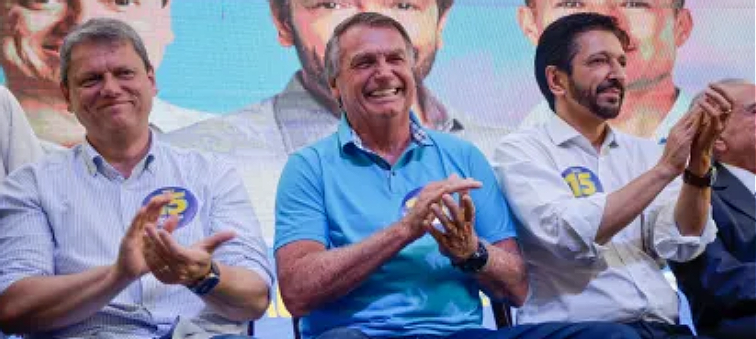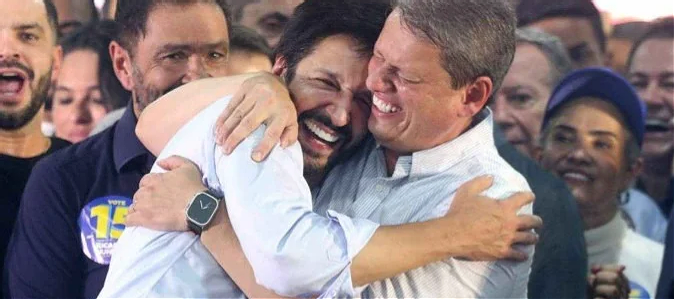Pragmatic Problem-Solver or Ideological Void? Brazil Eyes Tarcísio de Freitas
Pragmatic Problem-Solver or Ideological Void? Brazil Eyes Tarcísio de Freitas. Tarcísio Gomes de Freitas, a military engineer turned politician with a meteoric career, has ascended to the governorship of São Paulo on a platform of technical management and efficiency, free from ideological constraints.
Everton Faustino
5/14/20254 min leer


Pragmatic Problem-Solver or Ideological Void? Brazil Eyes Tarcísio de Freitas
Keywords: Tarcísio de Freitas, Brazil politics, São Paulo governor, infrastructure, 2026 election, Brazilian railways, Bolsonaro, pragmatic leadership.
Tarcísio Gomes de Freitas, a military engineer turned politician with a meteoric career, has ascended to the governorship of São Paulo on a platform of technical management and efficiency, free from ideological constraints. His trajectory, marked by strategic public sector roles and a successful tenure as Infrastructure Minister under Bolsonaro, positions him as a key figure in Brazilian politics. But who is Tarcísio de Freitas, and what sets him apart in a polarized political landscape?
Born in Rio de Janeiro in 1975, Freitas followed an unconventional path for a politician. Graduating in engineering from the Military Institute of Engineering (IME) and serving over a decade in the Brazilian Army, he gained expertise in infrastructure and logistics projects. This experience shaped his management approach, emphasizing planning, execution, and results.
His political entry was gradual. In 2011, he led the National Department of Transport Infrastructure (DNIT), where he excelled at unblocking stalled projects. In 2014, he became Secretary of Project Coordination for the Investment Partnerships Program (PPI), deepening his knowledge of concessions and privatizations.
The national prominence surged in 2019 with his appointment as Infrastructure Minister. Under his leadership, the federal government launched an ambitious concession and privatization program, attracting billions in investments for highways, railways, ports, and airports. His management style, characterized by efficiency and private sector engagement, earned him praise from business leaders and investors.
Despite his ministerial role under Bolsonaro, Freitas has consistently distanced himself from political polarization. His speeches prioritize technical management and pragmatic solutions. This stance, coupled with his reputation as an effective manager, has made him palatable to diverse political factions.
His 2022 electoral victory for the São Paulo governorship solidified his ascent. In a state traditionally governed by the PSDB, Freitas won over voters with a message of renewal and efficiency, promising to expedite projects, attract investment, and improve public services.
Leading Brazil's wealthiest state, Freitas has the opportunity to implement his management vision. His initial months in office have been marked by fiscal austerity, including spending cuts and contract reviews, and a push for private sector partnerships to boost infrastructure investments.
While praised for his pragmatism and management skills, Freitas must still prove his ability to tackle São Paulo's complex challenges. Public safety, healthcare, and education require innovative solutions and substantial investment. Moreover, he faces pressure from various interest groups and the need to build political consensus.
Freitas's career reveals an atypical profile in Brazilian politics. A military engineer, public manager, and rising political star, he is known for executing complex projects and seeking pragmatic solutions. His rapid rise and São Paulo victory place him at the center of national political discourse, and his performance will be pivotal in shaping his political future.
The meteoric rise has fueled speculation and pressure for a 2026 presidential bid. His image as an efficient manager, coupled with his ability to engage across the political spectrum, makes him a strong contender for the right, particularly given uncertainties surrounding Jair Bolsonaro's political future. However, Freitas remains cautious, focusing on his São Paulo duties and avoiding definitive statements about presidential ambitions.
Tarcisio's perceived lack of strong ideological convictions, which might be seen as a flaw elsewhere, could be precisely what Brazil needs amidst polarization. His ability to engage with diverse groups and seek pragmatic solutions may be key to unlocking the country's potential.
However, this lack of conviction also poses a risk. The absence of a clear ideological compass could lead to inconsistent decisions and hinder long-term project development. Time will tell if Freitas can reconcile pragmatism with the visionary leadership Brazil requires.
Freitas's public service, both as Infrastructure Minister and São Paulo Governor, highlights a growing focus on revitalizing the railway sector, addressing years of neglect.
The Historical Neglect of Brazilian Railways:
Decades of underinvestment and prioritization of road transport have plagued the Brazilian railway system.
This neglect has resulted in deficient infrastructure, with obsolete and underutilized sections.
Over-reliance on road transport has led to increased logistical costs, road degradation, and environmental impact.
Freitas's Efforts:
Freitas has shown a commitment to revitalizing the railway sector, attracting investment, and modernizing infrastructure.
As Infrastructure Minister, he promoted railway concessions and a new regulatory framework to attract private investment.
As São Paulo Governor, he continues this policy with projects like the Intercity Train, connecting key regions.
He has also shown interest in railway tourism, and the development of new railway lines for this sector.
Despite his efforts, railway revitalization is a complex, long-term challenge requiring significant investment and consistent policy.
Connecting the Dots:
Freitas's actions represent an attempt to reverse the historical neglect of Brazilian railways.
His efforts aim to diversify transport, reduce road transport dependency, and promote sustainable development.
However, railway recovery is a gradual process requiring sustained continuity and investment.
In summary, Tarcísio de Freitas has demonstrated a commitment to railway development, seeking to correct past mistakes and build a more promising future for the sector.
However, his recent decision to support the reelection of São Paulo Mayor Ricardo Nunes has sparked controversy. Critics argue this alliance compromises his technical management principles for political expediency. Nunes's administration faces scrutiny, raising doubts about Freitas's commitment to improving public services in Brazil's largest city. This move is also seen as an attempt to strengthen his political base and pave the way for future electoral ambitions, intensifying scrutiny of his motives and impact on his image as a pragmatic, ideologically neutral manager.


